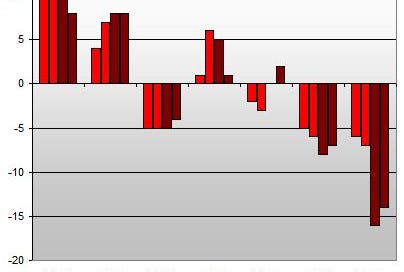The myth of Budget poll bounces
Welcome to the 98th edition of The Week in Polls, which takes a look at whether or not successful Budgets produce a bounce in the voting intention polls for the government.
Then it’s a look at the latest voting intention polls followed by, for paid-for subscribers, 10 insights1 from the last week’s polling and analysis. (If you’re a free subscriber, sign up for a free trial here to see what you’re missing.)
As ever, if you have any feedback or questions prompted by what follows, or spotted other recent polling you’d like to see covered, just hit reply. I personally read every response.
Been forwarded this email by someone else? Sign up to get your own copy here.
Already a reader and know others who might enjoy this newsletter? Refer a friend and you can get up to 6 months of free subscription to the paid-for version.
Want to know more about political polling? Get my book Polling UnPacked: the history, uses and abuses of political opinion polling.
The myth of Budget poll bounces
In the run-up to a Budget, and immediately after one, there is usually plenty of speculation about whether it will give the government a bounce.
But do Budgets really move the polls?
Short answer: no.
For the longer answer, featuring graphs, let’s start with the original analysis of Labour Budgets by Anthony Wells which inspired me to look at the question again:
The graph below shows the Labour lead in two YouGov polls immediately before the last seven budgets, and the two YouGov polls immediately after each one.
As you can see, there is hardly a history of Budgets leading to big improvements in Labour’s position. They crept up a point in 2003, but realistically 2006 is the only one where the budget can really have been said to have resulted in a boost for the government (for the record, there was nothing particularly outstanding in the 2006 budget.2 There were no real headline grabbing tax changes and the centerpiece was simply more money for schools).
That was then. How about now?
I’ve done a similar piece of analysis for all the Budgets with a Conservative Chancellor from 2010 until last year. As with Anthony’s previous analysis, I’ve taken the two YouGov polls from before the Budget and the two YouGov polls from after the Budget to compare things.3
Here’s what that analysis shows: an average boost in the Conservative vote share of… +0.1 points.
That’s an average which mixes in falls and rises, but even the absolute average change is only 1.2 points.
Only two of the 16 Budgets saw a change of 3 points or more, and one of those saw a fall rather than a rise in government support:4
In the short term,5 budgets don’t bounce much.6 And the biggest bounce is both cases was down, not up.
An Antipodean digression: previous analysis in Australia concluded that Budget bounces are an urban myth.
National voting intention polls
You know the score well by now: insert here references to Michael Foot, the Duke of Wellington7 and how long it it since the Conservatives were last on more than 30%. On average, the latest polls now even put them on less than 25%.
Here are the latest figures from each currently active pollster:
For more details and updates through the week, see my daily updated table here and for all the historic figures, including Parliamentary by-election polls, see PollBase.
Last week’s edition
(Some) good news for the Conservatives in the polls.
My privacy policy and related legal information is available here. Links to purchase books online are usually affiliate links which pay a commission for each sale. Please note that if you are subscribed to other email lists of mine, unsubscribing from this list will not automatically remove you from the other lists. If you wish to be removed from all lists, simply hit reply and let me know.
How to get respectably excited about a poll - and other polling news
The following 10 findings from the most recent polls and analysis are for paying subscribers only, but you can sign up for a free trial to read them straight away.
Keep reading with a 7-day free trial
Subscribe to The Week in Polls to keep reading this post and get 7 days of free access to the full post archives.





